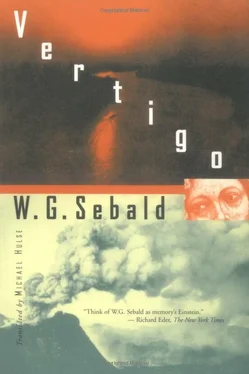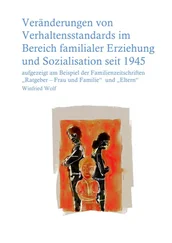Winfried Sebald - Vertigo
Здесь есть возможность читать онлайн «Winfried Sebald - Vertigo» весь текст электронной книги совершенно бесплатно (целиком полную версию без сокращений). В некоторых случаях можно слушать аудио, скачать через торрент в формате fb2 и присутствует краткое содержание. Год выпуска: 2001, ISBN: 2001, Издательство: New Directions, Жанр: Современная проза, на английском языке. Описание произведения, (предисловие) а так же отзывы посетителей доступны на портале библиотеки ЛибКат.
- Название:Vertigo
- Автор:
- Издательство:New Directions
- Жанр:
- Год:2001
- ISBN:978-0811214858
- Рейтинг книги:4 / 5. Голосов: 1
-
Избранное:Добавить в избранное
- Отзывы:
-
Ваша оценка:
- 80
- 1
- 2
- 3
- 4
- 5
Vertigo: краткое содержание, описание и аннотация
Предлагаем к чтению аннотацию, описание, краткое содержание или предисловие (зависит от того, что написал сам автор книги «Vertigo»). Если вы не нашли необходимую информацию о книге — напишите в комментариях, мы постараемся отыскать её.
Vertigo
The Emigrants
The Rings of Saturn
The New York Times Book Review
The Emigrants
Vertigo — читать онлайн бесплатно полную книгу (весь текст) целиком
Ниже представлен текст книги, разбитый по страницам. Система сохранения места последней прочитанной страницы, позволяет с удобством читать онлайн бесплатно книгу «Vertigo», без необходимости каждый раз заново искать на чём Вы остановились. Поставьте закладку, и сможете в любой момент перейти на страницу, на которой закончили чтение.
Интервал:
Закладка:
I do not believe that any of the locals ever spoke to them, nor as far as I know did the gypsies come into the village to hawk goods or tell fortunes. Where they came from, how they had managed to survive the war, and why of all places they had chosen that cheerless spot by the Ach bridge for their summer camp, are questions that occur to me only now — for example, when I leaf through the photo album which my father bought as a present for my mother for the first so-called Kriegsweihnacht. In it are pictures of the Polish campaign, all neatly captioned in white ink. Some of these photographs show gypsies who had been rounded up and put in detention. They are looking out, smiling, from behind the barbed wire, somewhere in a far corner of the
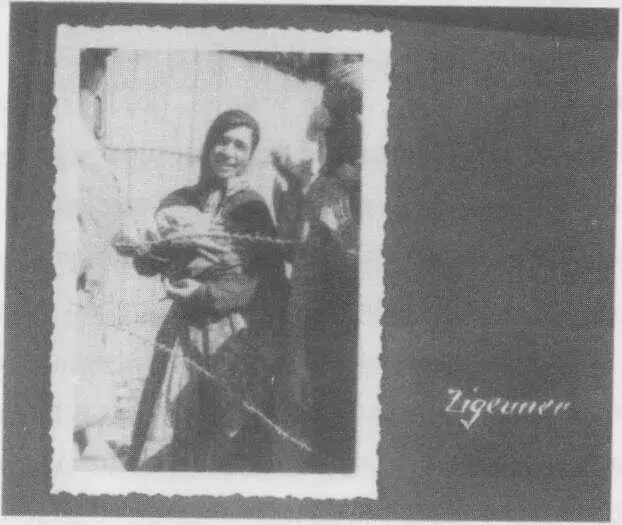
Slovakia where my father and his vehicle repairs unit had been stationed for several weeks before the outbreak of war.
A good thirty years had gone by since I had last been in W. In the course of that time — by far the longest period of my life — many of the localities I associated with it, such as the Altachmoos, the parish woods, the tree-lined lane that led to Haslach, the pumping station, Petersthal cemetery where the plague dead lay, or the house in the Schray where Dopfer the hunchback lived, had continually returned in my dreams and daydreams and had become more real to me than they had been then, yet the village itself, I reflected, as I arrived at that late hour, was more remote from me than any other place I could conceive of. In a certain sense it was reassuring, on my first walk around the streets in the pale glow of the lamps, to find that everything was completely changed. The house of the head forester, a small shingled villa with a pair of antlers and the inscription "1913" above the front door, together with its small orchard, had made way for a holiday home; the fire station and its handsome slatted tower, where the fire brigade's hoses hung in silent anticipation of the next conflagration, were no longer there; the farmhouses had without exception been rebuilt, with added storeys; the vicarage, the curate's lodge, the school, the town hall where Fürgut the one-armed clerk went in and out of with a regularity that my grandfather could set his watch by, the cheese dairy, the poorhouse, Michael Meyer's grocery and haberdashery — all had been thoroughly modernised or had disappeared altogether. Not even when I entered the Engelwirt inn did I have any sense of knowing my way around, for here too, where we had lived in rented accommodation on the first floor for several years, the whole house had been rebuilt and converted from the foundations up to the very rafters, not to mention the changes to the furnishings and fittings. What now presented itself, in the pseudo-Alpine style which has become the new vernacular throughout the Federal Republic, as a house offering refined hospitality to its patrons, in those distant days was a hostelry of disrepute where the village peasants sat around until deep into the night and, particularly in winter, often drank themselves senseless. The Engelwirt inn owed its local standing, which remained unassailable despite everything, to the fact that, in addition to the smoke-filled bar beneath the ceiling of which ran the longest and most crooked stove-pipe I have ever seen, it had a large function room in which long tables could be set up for weddings and funerals, with enough seating for half the village. Every fortnight the newsreel would be shown there and feature films such as Piratenliebe, Niccolò Paganini, Tomahawk and Monche, Màdchen und Panduren. The cavalry irregulars referred to in this this last title could be seen charging through dappled birch woods; Indians rode across limitless plains; the crippled violinist reeled off a cadenza at the base of a prison wall while his companion filed through the iron bars of his cell window; General Eisenhower, on his return from Korea, got out of an aeroplane, the propeller of which was still revolving slowly; a hunter whose chest had been torn open by a bear's paw staggered down into the valley; politicians were seen in front of the new parliament, climbing out of the back of a Volkswagen; and almost every week we saw the mountains of rubble in places like Berlin or Hamburg, which for a long time I did not associate with the destruction wrought in the closing years of the war, knowing nothing of it, but considered them a natural condition of all larger cities. Of all the events ever put on in the Engelwirt function room, it was an amateur production of Schiller's The Robbers, staged there several times during the winter of 1948 or 1949 which made the greatest impression on me. Half a dozen times, at least, I must have sat in the darkened Engelwirt hall among an audience some of whom had come over from neighbouring villages. Scarcely ever has anything that I have seen in the theatre since affected me as much as the The Robbers — Old Moor in the ice-cold exile
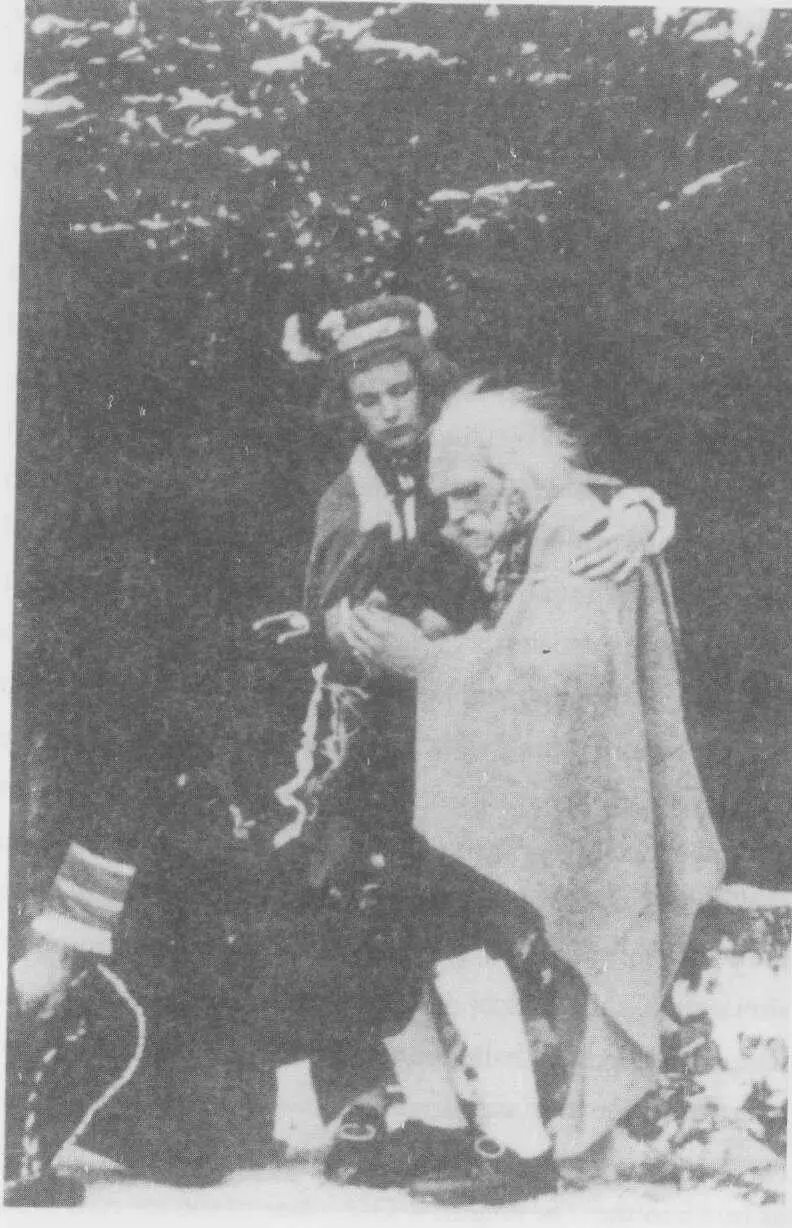
of his bleak house, the gruesome Franz with his deformed shoulder, the return of the prodigal son from the forests of Bohemia, or that curious slight movement of the body, never failing to excite me, with which the deathly pale Amalia said: Hark, hark! Did I not hear the gate? And there, before her, is Moor the robber, and she speaks of how her love made the burning sand green and the thorn bushes blossom, without ever knowing that the man from whom she still supposed herself to be separated by mountains, oceans and horizons had come home and was standing beside her. Always then I would wish to intervene in the proceedings and in a single word tell Amalia that she had only to reach out her hand in order to move from her dusty prison to that paradise of love she so desired. But since I could not bring myself to call out in this way, the turn that the events might otherwise have taken was never revealed to me. Towards the end of the play's run, in early February, it was given an open-air performance, in the paddock next to the postmaster's house, mainly, I suppose, so that a series of photographs could be taken. The winter's tale that resulted was notable not only on account of the snow which covered the ground in this open-air production even in the scenes set indoors, but mainly because Moor the robber now entered the action on horseback, which had of course not been possible in the function room. I believe it was on this occasion that I first noticed that horses often have a
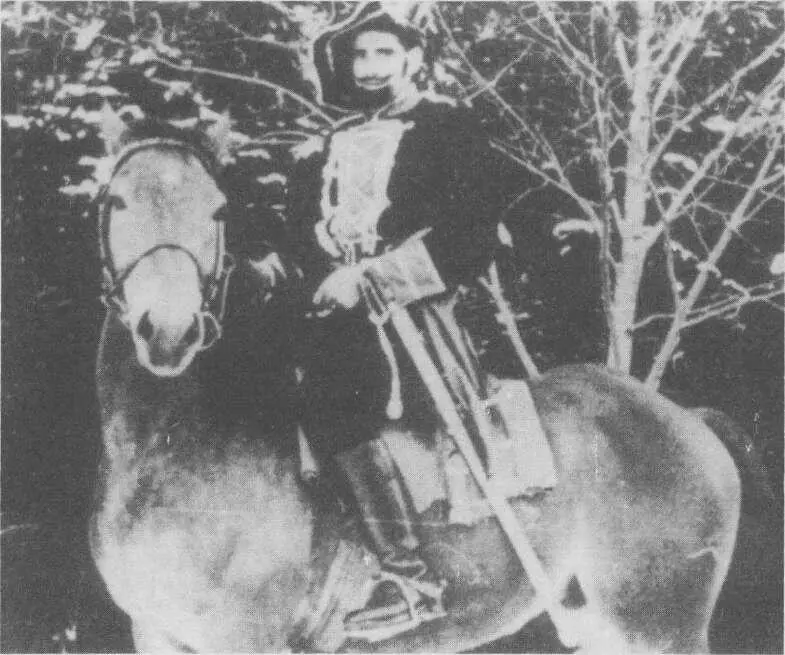
somewhat crazed look in their eyes. At all events, that performance on the postmaster's paddock was the last of The Robbers, and indeed the last theatre performance of any kind in W. Only during carnival time did the actors don their costumes once more, to join the carnival procession and take their places in a group photograph together with the fire brigade and the clowns.
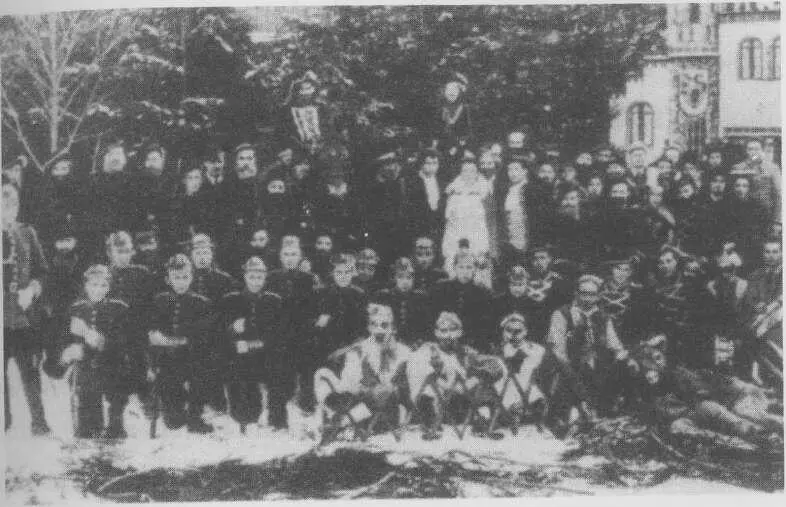
Behind the reception desk in the Engelwirt, after I had rung the bell several times to no avail, a tight-lipped woman eventually materialised. I had not heard a door open anywhere, not seen her come in, and yet there she suddenly was. She scrutinised me with open disapproval, perhaps on account of my outward appearance, which was none the better for my long walk, or because I betrayed an absent-mindedness that must have been unaccountable to her. I asked for a room on the first floor facing on to the street, initially for an indefinite period. Although it must have been possible to comply readily with my request, since November, in the hotel trade too, is the month of the dead, during which time the reduced service staff in the now vacant houses mourn the departed guests as if they had taken leave for ever — although a room on the first floor facing on to the street must without doubt have been available, the receptionist endlessly leafed back and forth in her register before handing the keys to me. She held her cardigan together with her left hand, as if she were cold, awkwardly and clumsily performing her tasks using only her other hand, so that it seemed to me as if she were marking time in order to make up her mind about this odd November guest. She studied the completed registration form, on which I had given "foreign correspondent" as my occupation and written my complicated English address, with raised eyebrows, for when and for what purpose had an English foreign correspondent ever come to W., on foot, in November, and unshaven to boot, and taken a room in the Engelwirt inn for an indefinite period! This woman, who was doubtless most efficient at all other times, seemed positively disturbed when, in reply to her enquiry after my luggage, I told her that it would be brought along that evening by an officer from the Oberjoch customs post.
Читать дальшеИнтервал:
Закладка:
Похожие книги на «Vertigo»
Представляем Вашему вниманию похожие книги на «Vertigo» списком для выбора. Мы отобрали схожую по названию и смыслу литературу в надежде предоставить читателям больше вариантов отыскать новые, интересные, ещё непрочитанные произведения.
Обсуждение, отзывы о книге «Vertigo» и просто собственные мнения читателей. Оставьте ваши комментарии, напишите, что Вы думаете о произведении, его смысле или главных героях. Укажите что конкретно понравилось, а что нет, и почему Вы так считаете.
